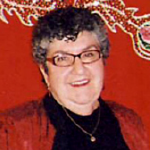
The following story was written by Liz Lippa and shared as part of the Memory Project.
I was born in Vienna, Austria, and I have always missed my family. Growing up in South America, I did have my parents with me, and I had a brother, an aunt and uncle, and a cousin, but I knew that I needed more than that. When I moved to the United States, and I heard my friends talking about other kids in the Jewish community who were related to them, I always envied them. I thought it would be so great to have people scattered around the city who were my family. I wanted to bump into someone down town or at a movie or a restaurant and tell my companion, “That’s my aunt” or “He’s my cousin.” It seemed to me that it gave them some special legitimacy to be connected as family to people around them. When I would hear about family reunions where there would be as many as a hundred people, I could hardly imagine how magnificent that would be.
When we lived in South America, my family consisted of the seven of us, and we all lived in the same house. When we came to the United States, four more people were added to my family group, but it still seemed quite meager. I knew that there were a few more aunts scattered around Europe and Asia and South America, but I never knew them or got letters or presents or birthday cards from them. My mother and father were each one of seven kids, and almost all of them had gotten married. I heard my mother talk about uncles and aunts and cousins she grew up around who were now missing from our lives. Where was everybody? What happened?
What happened was the Holocaust. People were snatched out of their lives, and many were murdered. Those who survived were scattered and in no situation to start a family in their precarious situations. As a result, I didn’t have the cousins I was meant to have. I felt the emptiness in my soul.
When I was a young woman, I went on a vacation to Florida, and there I saw my first banyan tree. This tree sprout roots that look like fronds that hang down from its branches. When these fronds reach the ground, they dig in, form roots, and eventually become new trunks that get thicker and stronger and then send out their own branches that will again send down new growth. This tree can grow to take up acres of land, and it is quite a phenomenal sight. In some parts of the world, people live in these trees by hanging partitions and dividing the space into rooms. In Florida, I saw a number of banyan trees that took up a whole yard next to someone’s house. However, most of the banyans were much smaller. Their growth was controlled by humans, who had cut off the fronds before they could reach the ground and set down roots and become trunks.
I was tremendously touched when this was described to me. I remember fighting back tears and feeling a deep grief well up inside of me. I remember thinking that this tree was the perfect metaphor for what had happened to my family and to so many other Jewish families in Europe. Hitler had cut us down and deprived us of our destiny. I bought a few postcards with pictures of this tree, and I taped one on my refrigerator when I got back home. It was like a memorial to my missing family. I continue to hold a special affection for the banyan tree.
I am so grateful that I was able to send down my own root fronds and that they all took hold and continued to sprout more fronds who are now growing to be strong trunks, and that I have been fortunate enough to witness this growth. I am the only person in my family who has been so blessed, and not a day goes by that I don’t appreciate this miracle. It is my personal revenge and victory. I know that all of us who have been able to survive and produce children after the Holocaust have the same feelings. We treasure our children and our grandchildren. They are the proof that we will endure as a people.
(June 2007)


I am touched by your story. The banyan tree shows what a community is and what a family is. Once we become strong, we give way for others to become strong. I am sorry about your family, and I am sure that they would be proud and happy to see how strong you have become